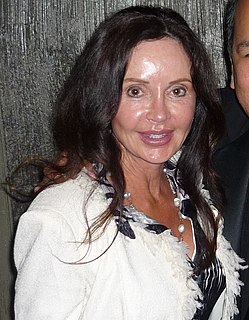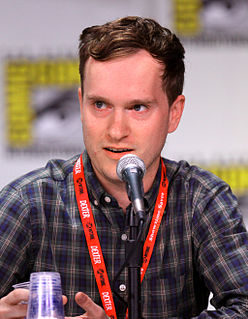A Quote by Amber Heard
I have a '68 Mustang, which is my baby. I've had her for about six years, which is kind of a miracle, considering how many times she's been stolen.
Related Quotes
It exasperated her to think that the dungeon in which she had languished for so many unhappy years had been unlocked all the time, and that the impulses she had so carefully struggled with and stifled for the sake of keeping well with society, were precisely those by which alone she could have come into any sort of sincere human contact.
Fine,' Aria conceded. 'But *I'll* carry her.' She grabbed the baby seeat from the back. A smell of baby powder wafted up to greet her, bringing a lump in her throat. Her father Byron, and his girlfriend, Meredith, had just had a baby, and she loved Lola with all her heart. If she looked too long at this baby, she might love her just as much.
She is older than the rocks among which she sits; like the vampire, she has been dead many times, and learned the secrets of the grave; and has been a diver in deep seas, and keeps their fallen day about her; and trafficked for strange webs with Eastern merchants, and, as Leda, was the mother of Helen of Troy, and, as Saint Anne, the mother of Mary; and all this has been to her but as the sound of lyres and flutes, and lives only in the delicacy with which it has molded the changing lineaments, and tinged the eyelids and the hands.
She realized how many of her beliefs were either unrealistic or belonged to her deceased parents and her ex-husband. She also realized that her expectations for herself and others were sometimes too rigid. She was trying to live up to what everyone else said was best for her, which made her depressed and hard to be around at times. Once she changed her beliefs about herself and others, she began to smile more and enjoy life.
One day, a pretty, fresh-faced young lady - intelligent and sincerely concerned - asked me if abortion wasn't preferable to making a young, unmarried girl have a baby she didn't want and which would, therefore, grow up unloved and probably turn out to be a criminal. I gave an answer which apparently she hadn't considered. I told her there were literally millions of people in this country who wanted but could not have children and who waited eagerly, sometimes for years, to adopt the baby she had described.
Occasionally, on screen, Barbara [Stanwyck] had a wary, watchful quality about her that I've noticed in other people who had bad childhoods; they tend to keep an eye on life because they don't think it can be trusted. After her mother was killed by a streetcar, she had been raised in Brooklyn by her sisters, and from things she said, I believe she had been abused as a child. She had lived an entirely different life than mine, that's for sure, which is one reason I found her so fascinating. I think her early life was one reason she had such authenticity as an actress, and as a person.
When she closed her eyes she felt he had many hands, which touched her everywhere, and many mouths, which passed so swiftly over her, and with a wolflike sharpness, his teeth sank into her fleshiest parts. Naked now, he lay his full length over her. She enjoyed his weight on her, enjoyed being crushed under his body. She wanted him soldered to her, from mouth to feet. Shivers passed through her body.
Sarah Brown is a sweetie to work with. She's a good actress. She's gutsy and she comes in and she knows her lines. She's just terrific. Sometimes I forget how young she is, because she truly walked right in and took the territory and was able to hold her own with people who've been here for so many years. To be able to pull that off [for someone who had never been on a show], I really give the woman a lot of credit. She's done great.
And yet, standing behind her son, waiting for the traffic light change, she remembered how in the midst of it all there had been a time when she'd felt a loneliness so deep that once, not so many years ago, having a cavity filled, the dentist's gentle turning of her chin with his soft fingers had felt to her like a tender kindness of almost excruciating depth, and she had swallowed with a groan of longing, tears springing to her eyes.
Yet there were times when he did love her with all the kindness she demanded, and how was she to know what were those times? Alone she raged against his cheerfulness and put herself at the mercy of her own love and longed to be free of it because it made her less than he and dependent on him. But how could she be free of chains she had put upon herself? Her soul was all tempest. The dreams she had once had of her life were dead. She was in prison in the house. And yet who was her jailer except herself?
The wide world was changing, and she wanted a different place in it. Not just wanted, but felt she deserved. If the world didn't owe her a living, as her mother repeatedly warned her, it owed her a break. She had a strong sense that a better, more exciting, more rewarding life than that which had been the lot of her parents and grandparents was hers by right. In this she was guilty of nothing more serious than the arrogance of youth, from which every generation suffers and by which it distinguishes itself from the preceding one.
It's important for the character, over the course of six years, to have checked off all the different boxes of the things that Mindy Kaling is trying to learn about herself to see what she wants. Which are the things that she's dreamed of since she was a kid that will ultimately be still important to her as a fully integrated adult and which ones are maybe just fantasies.
The girl had a certain nobleness of imagination, which rendered her a good many services and played her a great many tricks. She spent half her time in thinking of beauty, bravery, magnanimity; she had a fixed determination to regard the world as a place of brightness, of free expansion, of irresistible action, she thought it would be detestable to be afraid or ashamed. She had an infinite hope that she would never do anything wrong. She had resented so strongly, after discovering them, her mere errors of feeling.
Peter Hart, who's a pollster that's - who's done many focus groups about Hillary Clinton, talks about a glass curtain. She talks about the glass ceiling. He says voters feel there's a glass curtain between themselves and Hillary Clinton. They can't relate to her. They feel they don't really understand her, and that's made it easier for her opponents, of which there have been many over many years, to define her the way they want to.
The idea of the book ["The Japanese Lover"] came in a conversation that I had with a friend walking in the streets of New York. We were talking about our mothers, and I was telling her how old my mother was, and she was telling me about her mother. Her mother was Jewish, and she said that she was in a retirement home and that she had had a friend for 40 years that was a Japanese gardener. This person had been very important in my friend's upbringing.




































